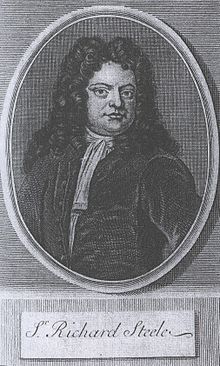Richard Steele
Sir Richard Steele (born March 1672 in Dublin , † September 1, 1729 in Carmarthen ) was an Irish writer and comedy writer. He was editor of the London Gazette and founder of The Tatler and The Spectator magazines . He also wrote for The Tatler under the pseudonym Isaac Bickerstaff , which Jonathan Swift had previously used in a campaign against the cobbler and astrologer John Partridge .
Life
Steele attended the Charterhouse School , where he made the acquaintance of Joseph Addison . He completed his further education in Oxford at Merton College . He then joined the British Army, where he served as a cavalryman with the Life Guards . His aversion to the soldier's life led to his first work The Christian Hero (1701), in which he dealt with different male roles in society.
He had his first literary success as a playwright with comedies such as The Tender Husband from 1703. In 1706 he was appointed editor of the London Gazette at the court of Queen Anne and her husband George of Denmark . On September 9, 1707 , Richard Steele married Mary Scurlock, whom he had met at the funeral of his first wife. Due to their correspondence of over 400 letters, which he wrote during the time they met until their death in 1718, both are considered one of the most famous literary couples.
In 1709 Steele founded the magazine The Tatler (der Chatterer), which quickly became a hit with the public but had to be discontinued after two years. Addison was a regular contributor to this project, and Swift also made some contributions. After the Tatler ended , Steele and Addison formed The Spectator . Steele recorded, among other things, the adventurous but true story of Alexander Selkirk , which Daniel Defoe later inspired to write the novel Robinson Crusoe . In 1713, Steele, who belonged to the Whigs' party, became a member of the House of Commons , but was soon expelled from it for having published a pamphlet in which he advocated the line of succession to the House of Hanover . When the Hanoverian George I ascended the throne the following year , Steele was appointed director of the Drury Lane Theater in London and knighted on April 9, 1715 as a Knight Bachelor ("Sir"). After an argument with Addison and wrangling with the government, he retired to Wales, where he spent the rest of his life.
Individual evidence
- ↑ http://www.bridica.com/EBchecked/topic/347068/London-Gazette
- ^ William Arthur Shaw: The Knights of England. Volume 2, Sherratt and Hughes, London 1906, p. 280.
literature
- Rudolf Beck, Konrad Schröder: Handbook of British cultural history: data, facts, background from the Roman conquest to the present. UTB, 2006. ISBN 3-82528-333-X . Pp. 157-161
Web links
- Works by Richard Steele at Project Gutenberg
- Literature by and about Richard Steele in the catalog of the German National Library
- Works by and about Richard Steele in the German Digital Library
| personal data | |
|---|---|
| SURNAME | Steele, Richard |
| ALTERNATIVE NAMES | Bickerstaff, Isaac (pseudonym) |
| BRIEF DESCRIPTION | Irish writer |
| DATE OF BIRTH | March 1672 |
| PLACE OF BIRTH | Dublin |
| DATE OF DEATH | September 1, 1729 |
| Place of death | Carmarthen |

